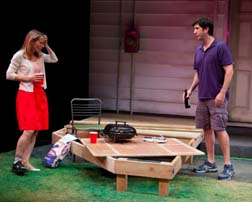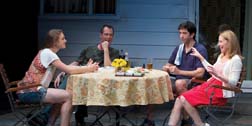By Lucy Komisar
Lisa D‘Amour‘s play “Detroit” is a dark metaphor for the disintegration of American society. The acting is very good, and Annie Kauffman‘s direction is sharp and gritty, but this script sometimes appears almost like a TV melodrama. It‘s as if a “big idea” was slapped on top of a roiling personal and social drama.
Detroit is never mentioned. The action takes place in the suburb of an unnamed city. It‘s Bright Town and even the streets are named after light, as in Solar Power Lane. Days were bright, meaning full of hope and good prospects, when the town got started.

Then there was a meltdown. The middle class couple still lives in a nice white clapboard house. The backyard is filled with the accoutrements of the good life: a metal table with umbrella and chairs and a fancy expensive barbecue grill. But husband Ben (David Schwimmer) has just lost his job which was, pointedly, loan officer in a bank. Now he is trying to invent an internet-based business to do financial advising. His wife Mary (Amy Ryan) is a paralegal, but that doesn‘t pull in enough to pay the bills.
The couple that moves next door is even worse off. Sharon (Sarah Sokolovic) works in a phone bank. Kenny (Darren Pettie) has some kind of job, not clear. They had been drunks, druggies, and were in rehabilitation for substance abuse when they met. They‘re now living in a deceased aunt‘s house. It‘s bare of furniture.

The two couples seem to bond. Or at least Mary takes it on herself to befriend Sharon and Kenny. She even drags over a mahogany coffee table as a gift.
But middle class largesse aside, the lines that separated Mary and Ben‘s lives from the others‘ are fading. The umbrella over the backyard table collapses. Slate is pulling away from the edge of the patio. The sliding door doesn‘t work.
Mary brings out hors d‘oeuvres: dates wrapped in bacon drizzled with chili oil. Perhaps the last desperate mark of the middle class. Later, when she and Ben visit the others, the snacks are Cheetos. Ben walks on the deck Ken is building and falls through, bloodying his leg.
That the middle and lower class are approaching each other in disintegration seems to be the message when they dance to rock music in a beer-fueled frenzy. At one point the two guys, when the women are away, discuss whether they should spend their few shekels in a local strip club.
We learn that in the past, this was a community where people pulled into driveways at 5:30 and had kids running into their arms. Now half the houses are falling apart and the other half are fancified for the rich.

The message then is that while Detroit burned, the middle class looked away and moved to the suburbs. Now that conflagration will eventually engulf them, too. Literally. Kenny‘s uncle Frank (John Cullum), who turns out to own the house his nephew and Sharon have been squatting in, appears as a coda. He provides tough advice to the well-meaning Ben and Mary, who are still making excuses for their disastrously dysfunctional neighbors.
But the symbolism doesn‘t quite make up for the fact that the narrative about Mary and Ben, Sharon and Ken is sometimes gripping, but is also missing something. The bizarre story never breaks out of its metaphor. The characters don‘t become real, and you really don‘t care about them.
“Detroit.” Written by Lisa d’Amour; directed by Anne Kauffman. Playwrights Horizons, 416 West 42nd Street, New York City. 212-279-4200. Opened Sept 18, 2012; closes October 28, 2012. 10/20/12.


We went to see this at the recommendation of my son’s drama teacher. Really wish we had read up on it first. I will say the actors were very good. However,it was way too melodramatic,loud and profanity filled every other word. Not sure what I was expecting,but it had nothing to do with Detroit or times changing,which is what was assumed when it was recommended. If we wanted to see druggies and alcoholics and dysfunction filled lives, we could stay home and look around the neighborhoods most anywhere.
Unfortunately, the theater we saw it in was small and there was no graceful way to leave. One time where great seats were not an asset,there was no escape without everyone knowing. Never again will I attend a show without first reading about it thoroughly first. However,kudo’s to the actors,they seem to have a fine talent,unless perhaps this is just the lives they live and know well.
The comment above is why we needed arts education in schools 40 years ago. if you’re focusing on the profanity then you’ve already lost. If you cannot understand the decimation of the middle class, is the main theme here ( and that is EXACTLY) how GEN Xers and Millennials speak to one another then again, I don’t know what to say…except swear a little…its fun.